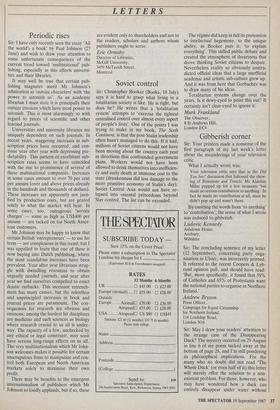Soviet control
Sir: Christopher Booker (Books, 18 July) says it is hard to grasp what living in a totalitarian society is like. He is right, but does he? He writes that a 'totalitarian system' attempts to 'exercise the tightest centralised control over almost every aspect of people's lives'. One of the points I was trying to make in my book, The Sixth Continent, is that the post-Stalin leadership often hasn't managed to do this. If it had, millions of Soviet citizens would not have been moving about the country each year in directions that confounded government plans. Workers would not , have been allowed to drink themselves into inefficien- cy and early death at immense cost to the state (drunkenness did less damage to the more primitive economy of Stalin's day). Soviet Central Asia would not have re- lapsed into oriental princedoms beyond Slav control. The list can be extended. The regime did keep in full its pretension to intellectual hegemony, to the unique ability, as Booker puts it, 'to explain everything'. This stifled public debate and created the atmosphere of dreariness that drove thinking Soviet citizens to despair. Nevertheless reality so obviously contra- dicted official ideas that a large unofficial academic and artistic sub-culture grew up. And it was from here that Gorbachev was to draw many of his ideas.
Totalitarian systems change over the years. Is it dewy-eyed to point this out? It certainly isn't clear-eyed to ignore it.
Mark Frankland
The Observer, 8 St Andrews Hill, London EC4


































































 Previous page
Previous page